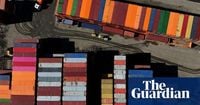British Steel, the last major steel manufacturer in the UK, is set to boost its workforce significantly as it prepares to ramp up production following a government intervention that saw the company taken into public ownership. On May 7, 2025, British Steel announced plans to hire over 180 new staff members in engineering, manufacturing, and business functions, marking a pivotal moment in the company's recovery.
The British government seized control of British Steel from its Chinese owners, Jingye Group, in April 2025. This move came after the company's blast furnaces in Scunthorpe, eastern England, were running at a loss and faced potential closure under Jingye's plans announced earlier in March. With the government now at the helm, British Steel aims to significantly increase its production of iron and steel in the coming months, responding to rising demand in key sectors such as rail, construction, and automotive.
Interim Chief Executive Allan Bell expressed optimism about the company's future, stating, "With government backing, we want to become one of the world's leading steel manufacturers. To help achieve this, and meet customer demand, we will be upping production." This ambitious goal comes at a time when British Steel has been struggling with high energy costs and a global oversupply of steel, which have severely impacted its operations.
However, the road ahead is not without challenges. The company has been losing approximately £700,000 ($922,000) a day, a situation exacerbated by a 25% tariff imposed by U.S. President Donald Trump on steel imports in March. British Steel's future also hinges on the UK government's ability to negotiate favorable trade agreements, especially with the U.S., which is currently a key market.
In parallel with British Steel's developments, a senior team of British trade negotiators has recently arrived in Washington, D.C., as efforts to finalize a trade deal with the United States intensify. The negotiations are crucial, especially with a UK-EU summit scheduled for May 19, 2025. UK officials are keen to secure an agreement that could alleviate tariffs on British exports, including steel, aluminum, and cars, in exchange for concessions on the digital services tax impacting U.S. tech companies.
However, the talks have faced significant hurdles, particularly following Trump's recent announcement of tariffs on the film industry, which has sparked concerns in Downing Street. One official noted, "The Trump administration keeps shifting the goalposts, as you saw with this week’s announcement on film tariffs." Trump's threat of imposing a 100% tariff on foreign-produced films has been particularly alarming for UK officials, as it could adversely affect Britain's burgeoning film industry.
Despite these challenges, UK officials remain hopeful about reaching a deal that addresses outstanding issues, particularly in pharmaceuticals and films. Trump has indicated plans to unveil tariffs on pharmaceutical imports within the next two weeks, a sector where the UK exported £6.5 billion worth of products to the U.S. last year.
As negotiations progress, Prime Minister Keir Starmer has made it clear that he will not compromise on British food production standards to facilitate trade with the U.S. agricultural sector. This stance comes as the government prioritizes securing a separate agreement with the EU, aiming to align British standards with European ones.
Starmer's administration has also been proactive in signing agreements with other nations, recently finalizing a deal with India that allows workers transferring to the UK from Indian companies to avoid paying national insurance while in the country. This concession has drawn criticism from some quarters, including Home Secretary Yvette Cooper, who was not informed of the decision in advance.
Despite the mixed reactions, Starmer defended the India deal in Parliament, calling it a "huge win" for the UK. Other senior Conservative figures have praised the agreement, suggesting that it aligns with the promises made during the Brexit campaign.
As British Steel prepares to expand its operations and the UK government navigates complex trade negotiations, the outcome of these developments could have significant implications for the UK's industrial landscape and economic future. The combination of government support for British Steel and ongoing negotiations with the U.S. highlights the critical intersection of national policy and global trade dynamics.
In conclusion, British Steel's recovery efforts and the UK government's trade negotiations are crucial to both the steel industry and the broader economy. As the situation unfolds, all eyes will be on how effectively the government can secure favorable trade terms while supporting key industries like steel and pharmaceuticals against the backdrop of shifting international relations.





